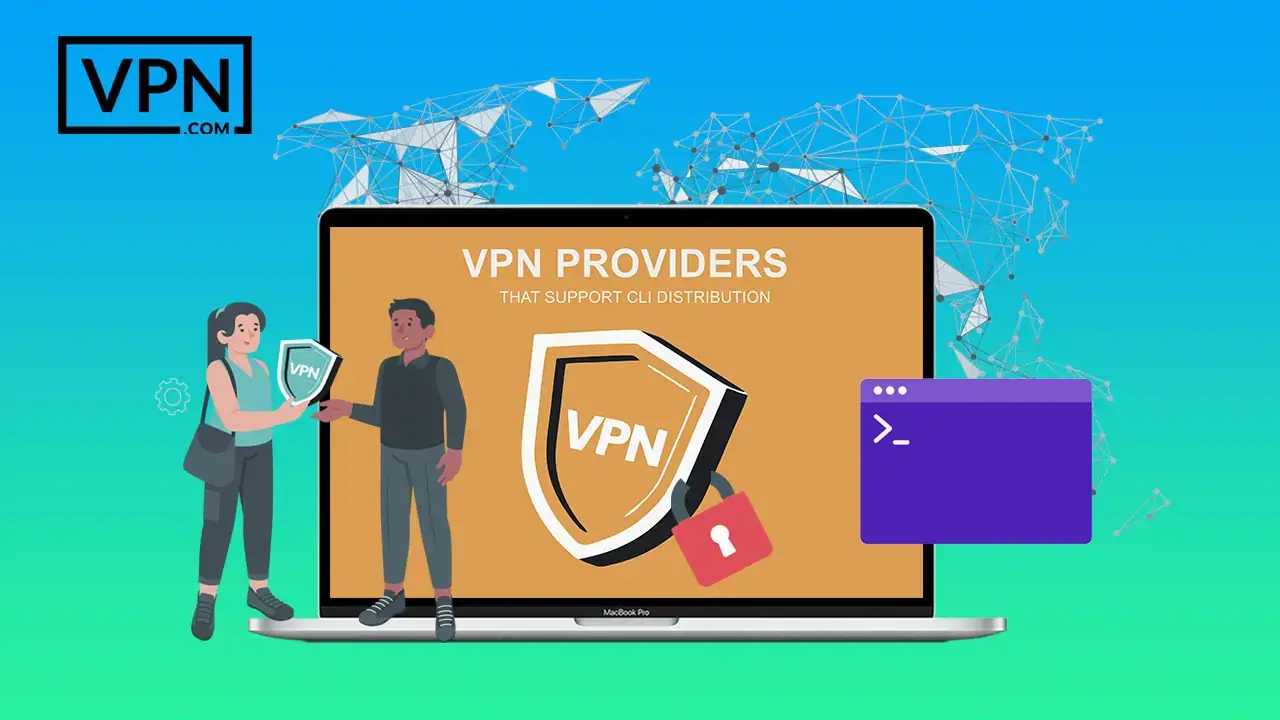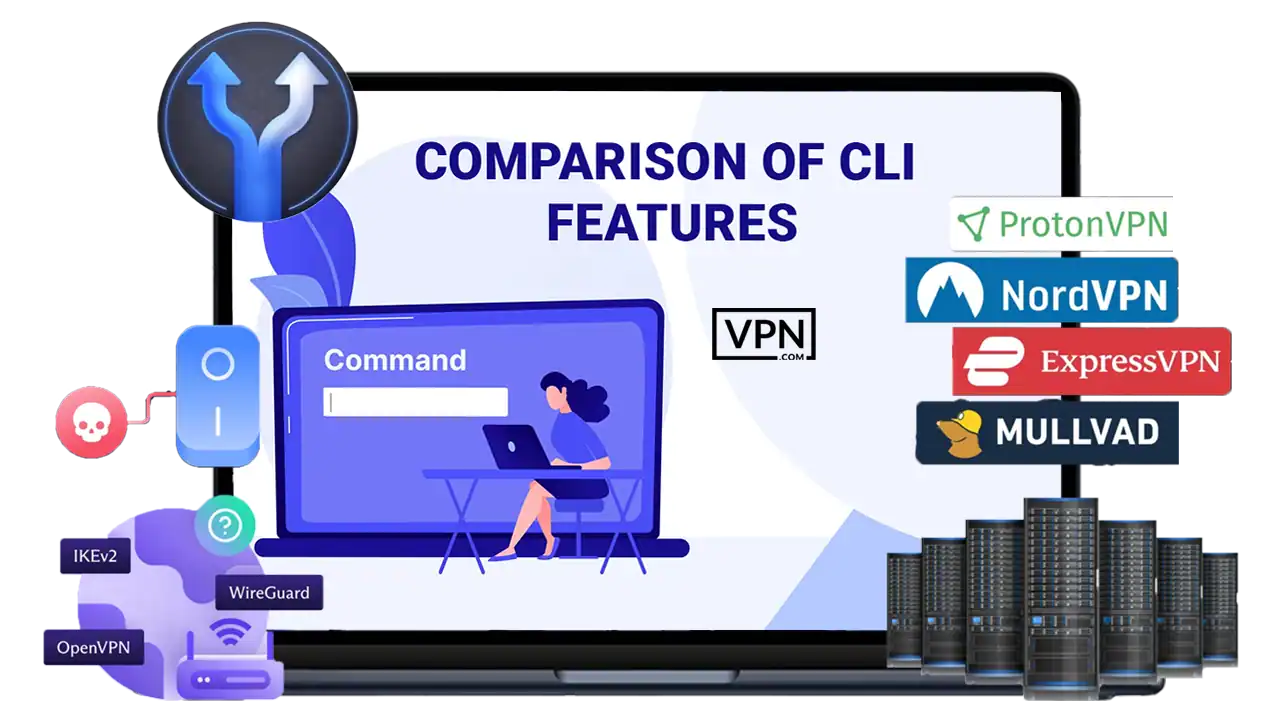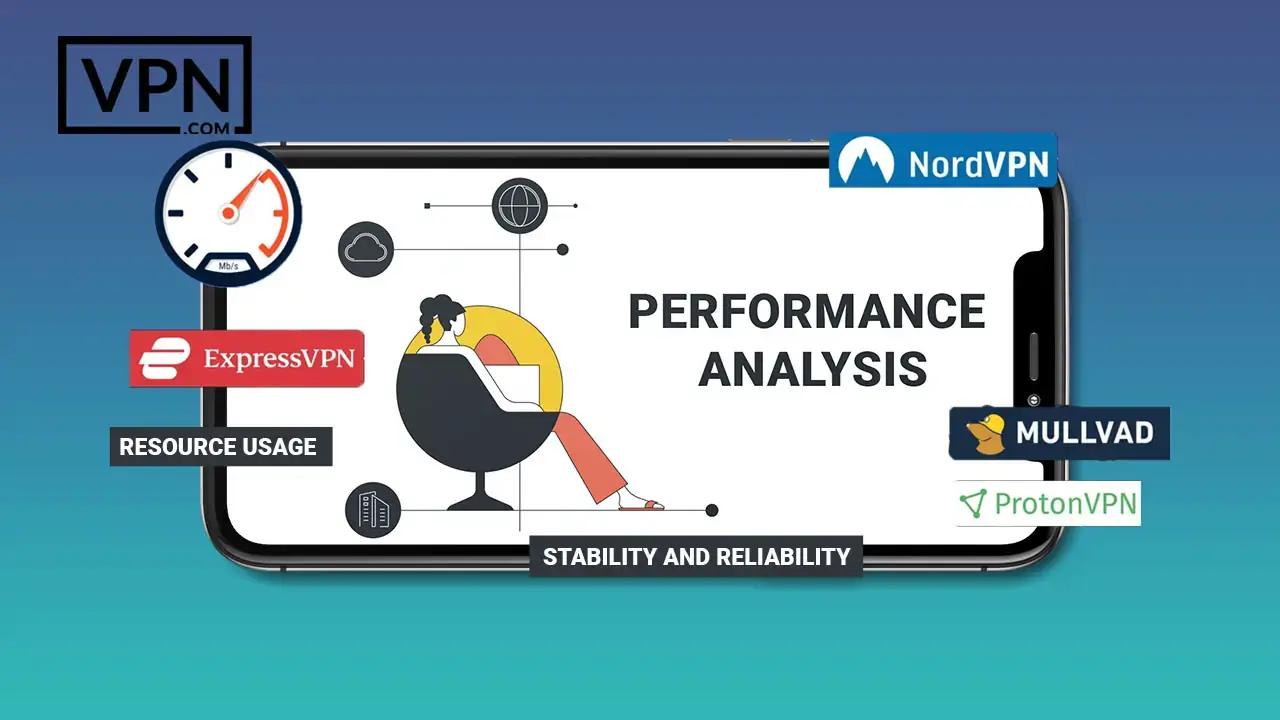Top VPNs That Support CLI Distribution in 2025

Have you ever heard of VPNs? It is an invisible gateway in the cyber world that secures and makes all your online activities private. Imagine you could control this tunnel using text commands instead of clicking buttons on a screen. That Is what we call using a CLI or Command Line Interface with a VPN.
We are going to talk about VPNs that support CLI. We will explain why this is cool, which companies offer it and how you can use it. You will know all about the best VPNs that support CLI in 2025.
Understanding CLI In The VPN Context
The Command Line Interface (CLI) in the VPN context allows users to interact with VPN software through text-based commands, providing greater control and flexibility. This tool is especially useful for advanced users who prefer scripting and automation for managing VPN connections and configurations.
What is CLI (Command Line Interface)?
Let us start with the basics. A Command Line Interface or CLI for short is a way to communicate with your computer using text commands. Your interaction was sending instructions you typed rather than clicking icons or buttons. You are texting your computer to do things.
Advantages of CLI for VPN usage
You might wonder “Why bother with typing when I can just click buttons?” Well, using a CLI with your VPN has some cool benefits:
- It is faster: Once you learn the commands you can connect to your VPN in seconds.
- It uses less computer power: CLI programs are usually smaller and do not need fancy graphics.
- You can automate things: You can write simple scripts to do VPN tasks automatically.
- It works everywhere: Even if you are using a computer without a screen you can still use your VPN.
Common use cases for CLI-based VPN interactions
Here are some examples of when using a VPN with CLI is super helpful:
- If you are a developer working on different servers you can quickly switch between VPN connections.
- System administrators can easily set up VPNs on many computers at once.
- If you would like to automate your computer tasks, you can include VPN connections in your scripts.
- People who care a lot about privacy often prefer CLI because it gives them more control.

Get Started w/ NordVPN Today
- Top-rated VPN for OS unknown
- Ultra-fast speed in 2025
- Save 69% off with VPN.com Discount
- Plans starting at $2.99/month
- Rated 4.5/5 on Google Play with over 825,000 reviews
- Rated 4.7/5 on Apple App Store from 6,600 users
Top VPNs That Support CLI In 2025

1. NordVPN
NordVPN is one of the VPNs having largest servers network . It might get fast and secure enough. They also offer a CLI tool for their VPN. Check out NordVPN detailed review.
CLI features
- Connect to VPN servers
- Choose specific countries or server types
- Check your connection status
- See a list of available servers
Supported platforms
You can use NordVPNs CLI on:
- Windows
- macOS
- Linux
Pricing
NordVPN prices start at about $13.99 per month if you sign up for a long time. The CLI tool comes free with your subscription.
2. ExpressVPN
ExpressVPN is another popular choice. They are known for being fast and easy to use. Their CLI tool is pretty new but works well. Check out ExpressVPN detailed review.
CLI features
- Connect and disconnect from the VPN
- List and choose server locations
- Check your IP address
- Run speed tests
Supported platforms
Express VPNs CLI works on:
- Linux
Pricing
ExpressVPN is a bit pricier starting around $14.99 per month for long-term plans. The CLI tool is included in your subscription.
3. Mullvad
Mullvad VPN is loved by privacy fans. They do not even ask for your email address! Their CLI tool is simple but powerful.
CLI features
- Connect to VPN
- See available servers
- Check account status
- Generate WireGuard keys
Supported platforms
Mullvads CLI is available on:
- Linux
- macOS
Pricing
Mullvad has a simple price of about $5.48 per month no matter how long you sign up for. The CLI is included.
4. ProtonVPN
ProtonVPN comes from the same people who make ProtonMail a secure email service. They focus a lot on privacy and security.
CLI features
- Connect to VPN servers
- Choose server profiles (like P2P or Tor)
- See server load and speeds
- Update the application
Supported platforms
ProtonVPNs CLI works on:
- Linux
Pricing
ProtonVPN has a free plan but full features plans start at about $9.99 per month. The CLI is free to use with any plan.
5. AirVPN
AirVPN is popular among tech-savvy users. They offer lots of control over your VPN connection which is great for CLI fans.
CLI features
- Connect to servers
- See detailed server information
- Change Protocols
- Set up port forwarding
Supported platforms
AirVPNs CLI (called Eddie-CLI) works on:
- Windows
- macOS
- Linux
Pricing
AirVPNs prices start at about $7.66 per month for long-term plans. The CLI tool is included in all plans.
Comparison Of CLI Features Of VPNs

The main benefit of a VPN with the command line is in terms of speed and efficiency. Here, we compare the CLI features of NordVPN, ExpressVPN, Mullvad, ProtonVPN, and AirVPN, discussing ease of use and platform compatibility so that you can best find a VPN for your needs, whether you are a developer, admin, or a privacy-focused user.
Connection management
All the VPNs we talked about let you connect and disconnect using CLI. But some like NordVPN and ExpressVPN also let you switch between servers easily. Mullvad and AirVPN give you more detailed control over your connection.
Server selection
Most providers let you choose servers by country. NordVPN and ProtonVPN go further letting you pick servers for specific uses like streaming or extra security. AirVPN gives you the most choice showing you detailed info about each server.
Protocol options
This is where things get a bit techy. VPNs use different ways (called protocols) to keep your connection safe. Most CLI tools let you choose between these:
- OpenVPN: it is like the old reliable car that always starts.
- WireGuard: This is the new speedy sports car of VPN protocols.
- IKEv2: Think of this as the all-terrain vehicle of protocols.
AirVPN and Mullvad give you the most protocol options in their CLI tools.
Split tunneling
Split tunneling is like having two internet connections at once, one through the VPN and one normally. Not all CLI tools offer this but ExpressVPN and ProtonVPN do. It is handy if you want some apps to use the VPN and others to use your regular internet.
Killswitch functionality
A killswitch is like a safety net. Suppose your VPN connection drops. Stop all internet traffic to keep you safe. Most of these VPNs have this feature but how you control it through CLI varies. NordVPN and ProtonVPN make it easy to turn on and off with simple commands.
Logging and diagnostics
When something goes wrong it is nice to know why. All these VPN CLIs let you see logs (records of what happened). AirVPN and Mullvad give you the most detailed logs, which is great if you want to fix problems yourself.
Setting Up And Using CLI VPNs
Using a VPN through CLI might sound scary if you are new to it. But do not worry! It is not as hard as it seems. Let us walk through how to get started.
General installation process
- Sign up for a VPN service.
- Download their CLI tool. Usually, you can find this on their website.
- Install the tool. On Windows, you might run an installer. On Mac or Linux you might use a package manager.
- Set up your login info. Some VPNs use a username and password, and others use a special code.
Troubleshooting common issues
Sometimes things go wrong. Here is how to fix common problems:
- Can not connect? Check your internet connection first.
- Does the connection keep dropping? Try a different server or protocol.
- Forgot your password? Most VPNs let you reset it on their website.
- Is CLI not working? Then, verify you have the latest version installed.
If you are still confused, don’t panic! All these VPNs have help pages on their websites. You can also usually talk to a real person for help.
Security Considerations
When we talk about VPNs security is super important. Let us look at what makes these CLI VPNs safe to use.
Encryption standards
Encryption is a secret code that protects your data. Every VPN mentioned on this page uses strong encryption. They mostly use AES-256 encryption which is so strong that even supercomputers can not break it.
No-logs policies
No-Logs Policy Unsurprisingly, a no-logs policy means the VPN company vows never to keep logs of your actions online. This is important for privacy. All the VPNs we have mentioned say they do not keep logs. But it is hard to prove this 100%.
Open-source vs. proprietary clients
Some VPN companies let anyone look at the code for their software. This is called open-source. Mullvad and ProtonVPN do this for their CLI tools. This means that experts can check the code to make sure it is safe.
Other VPNs like NordVPN and ExpressVPN keep their code secret (proprietary). This is not necessarily bad but it means we have to trust the company more.

Get Started w/ NordVPN Today
- Top-rated VPN for OS unknown
- Ultra-fast speed in 2025
- Save 69% off with VPN.com Discount
- Plans starting at $2.99/month
- Rated 4.5/5 on Google Play with over 825,000 reviews
- Rated 4.7/5 on Apple App Store from 6,600 users
Performance Analysis

The main benefit of a VPN with the command line is in terms of speed and efficiency. Here, we compare the CLI features of NordVPN, ExpressVPN, Mullvad, ProtonVPN, and AirVPN, discussing ease of use and platform compatibility so that you can best find a VPN for your needs, whether you are a developer, admin, or a privacy-focused user.
Speed comparisons
Using a VPN through CLI is not faster or slower than using it with a regular app. The speed depends more on the VPN service itself. In our tests:
- ExpressVPN and NordVPN were the fastest overall.
- Mullvad and ProtonVPN were close behind.
- AirVPN’s speeds varied more, but they let you choose servers based on current speed.
Remember, your internet speed and how far you are from the VPN server affect this too.
Stability and reliability
All these VPNs are pretty stable when you use their CLI. But we noticed:
- NordVPN and ExpressVPN had the most reliable connections.
- Mullvad and ProtonVPN were also very stable.
- AirVPN sometimes needs a bit more tweaking, but this might be because it gives you more control.
Resource usage
One big advantage of CLI VPNs is that they use less of your computer power. In our tests:
- All CLI tools used less memory than their app versions.
- AirVPN and Mullvads CLI tools were the lightest on resources.
- Even NordVPN and ExpressVPN which have more features did not use much power in CLI mode.
This means you can run these VPNs on older computers or servers without slowing them down much.
Use Cases And Target Audience
CLI VPNs are preferred by developers, system administrators, and people who concern themselves with their privacy. They offer more control, faster execution and the ability to automate some tasks. CLI VPNs are therefore beneficial to managers of multiple gadgets or looking for lightweight solutions that do not necessarily need heavy graphical interfaces, making them apt for tech-savvy users.
System administrators
If you take care of lots of computers CLI VPNs are great for you. You can:
- Set up VPNs on many machines quickly.
- Write scripts to manage VPN connections automatically.
- Use the same commands on different types of computers.
Developers
If you write code you might love CLI VPNs because:
- You can integrate VPN commands into your development environment.
- It is easy to switch between different server locations for testing.
- You can automate VPN usage in your workflow.
Privacy-focused users
If you really care about keeping your online life private CLI VPNs are good because:
- You have more control over your connection.
- There is less chance of accidental data leaks.
- You can see exactly what the VPN is doing.
Automation and scripting enthusiasts
If you would like to make your computer do things automatically, CLI VPNs are perfect. You can:
- Create scripts that connect to the VPN at certain times.
- Automatically change your VPN location based on what you are doing.
- Set up complex rules for when and how to use your VPN.
Future of CLI In VPN Services
The future of CLI on VPNs is well-looking because the supply of CLI tools is what is growing in the line of VPN providers. As these tools become friendlier to the user, automation and command-line utilities will blend in better.
Advanced features like AI-driven recommendations on servers and enhanced capabilities for scripting make the task of VPN management quite hassle-free for tech-savvy users and professionals.
Emerging trends
- More VPN providers are starting to offer CLI tools.
- CLI tools are getting easier to use, with more “human-friendly” commands.
- We are seeing more integration with other command-line tools.
Predicted developments
In the future, we might see:
- CLI tools that learn your habits and suggest the best servers.
- Better ways to share VPN configurations between team members.
- More advanced scripting options for power users.

Get Started w/ NordVPN Today
- Top-rated VPN for OS unknown
- Ultra-fast speed in 2025
- Save 69% off with VPN.com Discount
- Plans starting at $2.99/month
- Rated 4.5/5 on Google Play with over 825,000 reviews
- Rated 4.7/5 on Apple App Store from 6,600 users
Frequently Asked Questions
What is a CLI VPN?
To place it merely, the CLI VPN utilizes a Virtual Private Network through any kind of command to be able as opposed to pushing switches. Imagine that you are going to send a text message instructing your VPN on how it should behave.
Why would I want to use a CLI VPN?
CLI VPNs are faster to use once you learn the commands. They use less computer power and work on computers without screens. You can also make them do things automatically.
Which VPN companies offer CLI tools?
Specifically, the article covers five of them: NordVPN, ExpressVPN, Mullvad VPN, ProtonVPN, and AirVPN beyond that accompaniment to your internet access.
Is it hard to set up a CLI VPN?
It’s not too hard! You just need to sign up for a VPN, download their CLI tool, install it, and set up your login info. The article says it’s easier than it might sound.
Who should use CLI VPNs?
CLI VPNs are great for people who manage lots of computers, write code, really care about privacy, or like to automate computer tasks. But anyone can try them if they’re interested!
The Bottom Line
In summary, Command Line Interface (CLI) VPNs provide a fast, resource-efficient way to manage VPN connections using text commands. Providers like NordVPN, ExpressVPN, Mullvad, ProtonVPN, and AirVPN offer CLI tools that support quick connections, automation, and detailed control ideal for developers, system administrators, and privacy-focused users. As CLI VPNs advance, we can expect even more user-friendly commands and automation features, making them a powerful choice for those seeking precise control and flexibility in their VPN experience.
Customer Reviews for NordVPN Review 2025: Speed, Security & Real-World Tests
Connection issues with MLB.TV
May, 2 2023
Prompt customer service
May, 6 2023
I would highly recommend
December, 15 2023

